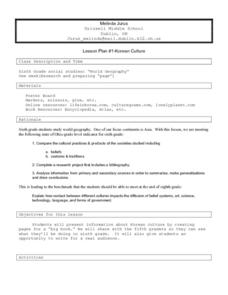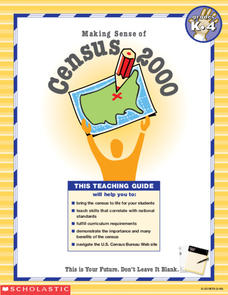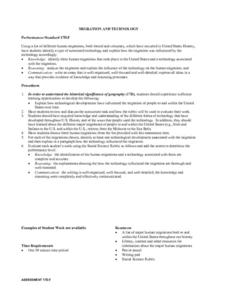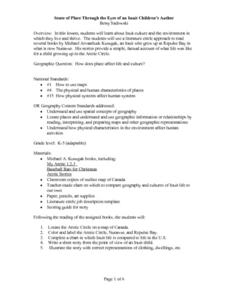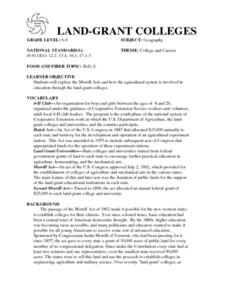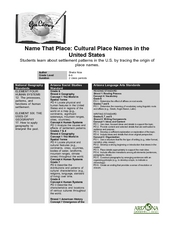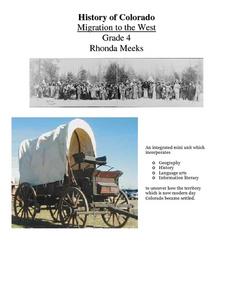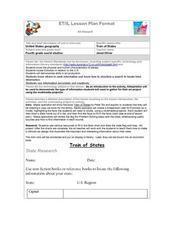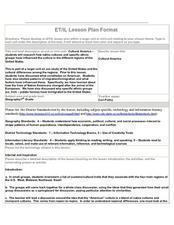Curated OER
What If We Run Out?
Students explore the consequences of shrinking habitats and the human impact on wildlife populations. They participate in a game to study the consequences and describe the preservation of animal habitats.
Curated OER
Fish Haunts
Students examine some of the different ecosystems that fish live in. While doing this they identify the species of fish and the ecological conditions needed for survival. Students use research resources to make fish cards that have...
Curated OER
Habeas Corpus and“Enemy Combatants”
Students explore the implications of habeus corpus. In this habeus corpus activity, students participate in reader's theatre activity regarding the origin of habeus corpus. Students then investigate the Hamdi v. Rumsfeld case and...
Curated OER
Physical Location; How a Border Town Might Develop
Students speculate how a location can develop into a large town. They investigate the physical resources and how populations can grow. There are guiding questions to help students through the research and class discussion. Students make...
Curated OER
To War or Not To War!
Ninth graders examine the various types of propaganda used during World War II. In groups, they make notes on each example and determine why they believe the opinion of the United States involvement in the war changed. They share their...
Curated OER
Sing a Song of Coinage
Students examine the Tennessee state quarter. They discuss Tennessee's musical heritage, examine all of the coins and as a group, create a song about coins or money. They also complete worksheets pertaining to the lesson.
Curated OER
The European Union
Ninth graders construct a timeline depicting the development of the European Union and label and color countries on a map belonging to it. They write essays about how the Union affects the United States.
Curated OER
Making Sense of the Census
In this unit of lessons, students make sense of the census. They examine why a census is taken and participate in activities.
Curated OER
Korean Culture
Sixth graders complete a research project for the sixth grade Big Book that is to be shared with the 5th graders. Students should take their time because the project represents them and the whole class.
Curated OER
Making Sense of the Census
In this unit of lessons, students make sense of the Census. They examine why a census is taken and participate in activities.
Curated OER
The English Settle America
Sixth graders compare immigration today with that of the colonial period. They locate colonies on a map and describe reasons their families immigrated to the United States.
Curated OER
Migration and Technology
Students identify a technological innovation associated with human migration, either forced or voluntary. They explain how the migration was influenced by technology and how technology influences migration through a written essay.
Curated OER
Sense of Place Through the Eyes of an Inuit Children's Author
Students read books by Michael Arvaaluck Kusugak to explore life in the Artic Circle. After reading the books, students compare and contrast life in the Artic Circle to life in the United States. They write and illustrate a story about...
Curated OER
LAND-GRANT COLLEGES
Students will explore the Morrill Acts and how the agricultural system is involved in education through the land-grant colleges.1. Have groups find the addresses of the land-grant universities in their assigned states and
write a letter...
Curated OER
Name That Place: Cultural Place Names in the United States
Students examine the origin of the people that settled in the United States. In this United States History instructional activity, students work in small groups to complete several activities that explore early settlement, such as a...
Curated OER
Order Out of Borders
Students examine the differences between natural and man-made borders by investigating the Texas quarter. They create clay models of the state of Texas.
Curated OER
Southern Agriculture and the Slave Trade
Students examine the relationship between agriculture and the slave trade during the 1860s. In groups, they research how two factors led to the explosion of slavery in the Southern United States. Using maps, they answer comprehension...
Curated OER
Latitude and Longitude
Fifth graders study latitude and longitude. They estimate the latitude and longitude of their hometown and find the latitude and longitude of other cities using a map. They use a website to find out the cities' actual latitude and...
Curated OER
History of Colorado-Migration to the West
Fourth graders identify reasons for people moving to the Colorado Territory and examine how moving in the 1800's is different than moving today. They also practice reading maps and gathering information from maps, as well as, describe...
Curated OER
Defining Moments From the Past: Japanese American Internment
Learners conduct a mock Congressional Hearing to decide whether or not Japanese Americans who were sent to internment camps during World War II should be provided financial restitution. They research and create a time line of events...
Curated OER
Escape From the Antlion's Pit
Students draw conclusions about the effectiveness of antlion's pits in catching prey. A brief review of the antlion and its hunting habits is conducted. After watching a video about the use of pits to catch prey, students complete a...
Curated OER
The World In My Community
Students identify products in their community which are imported from other countries. After conducting a personal household survey, students research the product's country of origin. They discover the role imports have upon their...
Curated OER
Train Of States
Fourth graders create a class book with information about each of the United States. After students draw a state name out of a hat, they use various resources to fill in a facts chart about their state. Students draw the state flag and...
Curated OER
Cultural America
Seventh graders investigate the cultural differences that can be found in America. They discuss what it means to be called an American. The patterns of migration to America are discussed with the use of maps and geographical terms....










